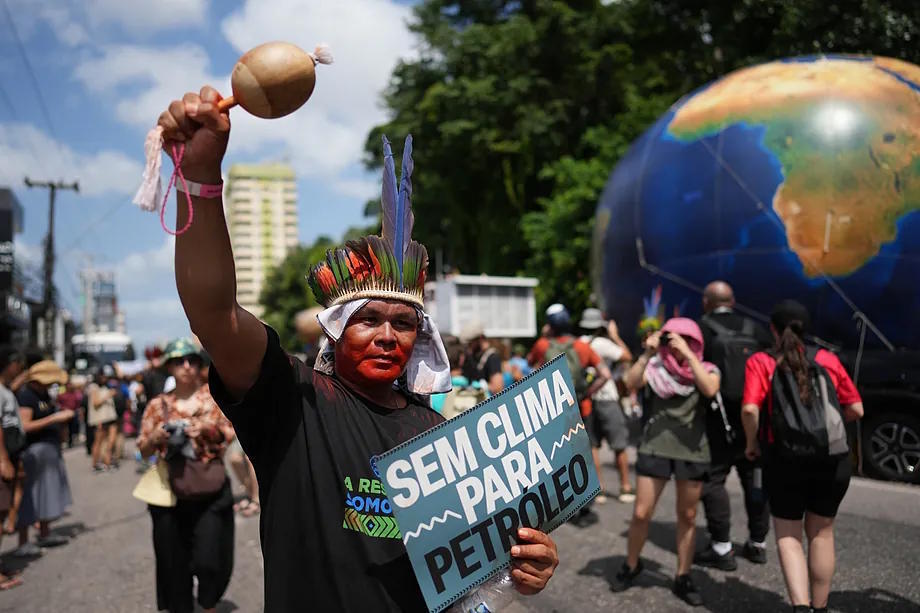At the Paris Climate Summit (COP21), and in all subsequent COPs, Saudi Arabia assumed the role of the quintessential petrostate, threatening to boycott any mention of fossil fuels in the final agreement. At the Belém COP30, the United States has climbed with its notable absence to the podium of petrostates, where Donald Trump shares dishonors with Vladimir Putin (the last time the Russian president attended a climate summit was precisely in Paris, ten years ago).
On the opposite pole, we have China, confirming this year its status as the "world's first major electrostate" (strong words from the Financial Times). The Asian giant has just surpassed the milestone of 1,000 gigawatts of installed solar capacity this year (equivalent to half of the entire planet) and has launched ambitious projects like the Great Solar Wall. Electric car sales have surpassed combustion vehicles in 2025, ten years earlier than expected. And although it remains the world's largest CO2 emitter, for the first time, it has committed to an international reduction (from 7% to 10% by 2035).
"China is willing to work with all parties to steadfastly promote green and low-carbon development," announced Vice Premier Ding Xuexiang, Xi Jinping's emissary, at the Belém COP30. Meanwhile, in the United States, Energy Secretary and fracking entrepreneur Chris Wright continues to deny the evidence: "There is no climate crisis, and we are not in the middle of an energy transition."
The reality is that China is already earning more revenue from exporting green technology than the United States is from exporting oil. This was emphasized a few days ago at the COP30 by California Governor and Democratic presidential hopeful Gavin Newsom: "Do you know who is celebrating and applauding Trump's decisions? President Xi of China, who can lean back in his chair while dominating production chains because he has understood the great opportunity of clean energies."
Beyond the rhetoric, what is brewing behind our backs is an "emerging energy bipolarity," warn analysts Tatiana Mitrova and Anne-Sophie Corbeau on the NationalInterest portal. "On one side, we have the petrostates - the United States, Russia, and Saudi Arabia - redoubling their efforts in the production and export of fossil fuels. On the other side, we have the electrostates, led by China and increasingly by Europe. We are facing an asymmetric rivalry that reflects the competition for global influence and economic resilience."
Other analysts are already directly referring to an energy "cold war," contrasting with the multilateral climate that was the main legacy of the Paris COP21. At COP30, the frictions between the two blocs are becoming evident in the final stages of negotiations.
A coalition of around 60 European, Latin American, African countries, and island states are pushing for a "roadmap" for the planned reduction of coal, oil, and gas. The proposal could include a timeline and go beyond COP28 in Dubai, which was saved in extremis with the vague commitment to "transition away from fossil fuels."
The coalition aims to have the support of around a hundred delegations but faces staunch opposition from at least 40 countries, led by petrostates. Brazilian Environment Minister Marina Silva has emerged this week as the main advocate of the proposal: "The roadmap is a response to our scientific knowledge and is also an ethical response (...) It makes no sense to continue investing in the polluting and inefficient models of the 20th century."
Brazil is currently at a crossroads. The country at COP30 indeed fits into the petrostate bloc: this year, it reached a record of 4.9 million barrels of oil per day. Its ambition is to become the fifth-largest oil producer by 2030 and the state-owned company Petrobras ranks second in global expansion plans.
The Belém COP30 was preceded by the controversial approval for oil exploration at the mouth of the Amazon, weeks after the approval in Parliament of the so-called "devastation law" weakening environmental protections. President Luiz Inácio Lula da Silva has justified the double standard by arguing that oil revenues will accelerate the ecological transition while also demanding "a roadmap for humanity to overcome, fairly and planned, its dependence on fossil fuels."
The paradox is even more evident in another petrostate like Norway, the second-largest oil producer in Europe (after Russia), which allowed the creation of a sovereign fund that has accelerated the country's electrification. Nine out of ten cars sold and one out of three in circulation in the Nordic country are electric. With significant investments in infrastructure and tax incentives for purchases, Norway's firm progress towards a 100% electric fleet contrasts with fluctuations in other European countries.
In the bipolar world we are already in, there are contradictions like Saudi Arabia or the United Arab Emirates, determined to promote solar energy domestically while continuing to boost oil exports. Despite the push for renewable energies, China and India, on the other hand, continue to open and plan coal-fired power plants.
With the planned extraction projects, by 2030, there will be a doubling of fossil fuels consistent with the scenario of a 1.5-degree temperature increase set in the Paris Agreement. According to a recent report from Climate Action Tracker, the global temperature increase could reach 2.6 degrees compared to the industrial era over the century with the plans presented by over a hundred countries at COP30.
The role played by lobbies in the last four climate summits has also called into question the supposed progress. Over 5,000 fossil fuel lobbyists participated in the COPs in Glasgow, Sharm El-Sheikh, Dubai, and Baku. In the capital of the United Arab Emirates, a record 2,456 lobbyists may have influenced the negotiations. In Belém, oil interests are once again being defended behind the scenes by 1,600 lobbyists.
